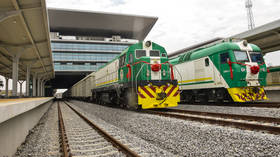Nigeria finds new Asian financier for rail project

Nigeria’s Kaduna-to-Kano rail project, between two of the nation’s major cities, has found a new financier in China Development Bank after the previous Chinese lender withdrew its support in 2020. The West African country’s senate on Tuesday approved the $973 million loan, which comes with a 15-year term and a 2.7% interest rate.
China’s Exim Bank was named in 2020 as the creditor for the railway modernization project, with a $22.8 billion government external borrowing plan, before it withdrew.
The senate approved amendments to the initial terms, reducing the loan from $22.8 billion to $973 million and naming China Development Bank as the new creditor.
The loan, which will be provided in Euro currency, will also include a 0.4% commitment fee and a 0.5% upfront fee.
According to Senate President Ahmad Lawan, the agreement with China Development Bank is merely a modification of the previously approved but yet to be obtained loan.
The Kaduna-to-Kano railway is one of many infrastructure projects that the Nigerian government has been trying to fund in recent years. However, securing the necessary money has been a major constraint.
Nigeria’s transport and power difficulties have stymied economic growth for decades, holding back the distribution of wealth in Africa’s biggest economy, where 40% of people live below the national poverty line.
President-elect Bola Tinubu has pledged to tackle Nigeria’s many challenges, including inflation and oil theft.
China has contributed significantly to infrastructure development in Nigeria, including the Lekki Deep Sea Port, the largest in West Africa, and the Lagos Rail Mass Transit Blue Line project, West Africa's first electric-powered light rail. According to the parties involved, the projects will open up new opportunities for economic development in the oil-rich country and contribute to China-Africa cooperation in 2023.













